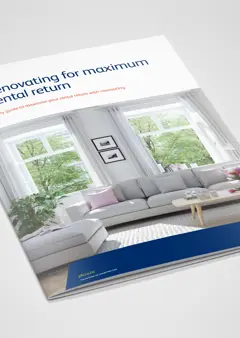6 questions you need to ask before renovating a rental property
Property Management

By continuing, you agree to our terms of use and privacy policy
Instructions on how to reset your password will be sent to the email below.
Your password reset link has been sent. Please check your inbox and follow the instructions provided.
Property Management

This is the number one question to consider before any rental renovation. Ask yourself, why are you renovating, and what (or how much) do you hope to gain out of it?
Bringing an old, tired rental property up-to-standard is an excellent way to increase your rental yield. For example, modernising an old three-by-two home may allow you to increase your weekly rent rate by $50. Your property might go from drawing $320 per week to $380. Over the course of a year, that’s an extra $2,600.
However, be realistic. If you spend $20,000 on a state-of-the-art kitchen, you probably won’t recoup that cost in your rental return—not without pushing your let fees well above the market rate.
Sites such as builderscrack can provide cost estimates and quotes for most renovation jobs. Use this information to budget your project, calculate the potential return on investment, and weigh up the cost against the benefits.
As a rule, don’t replace something that can be fixed or repaired. Renovating is a costly exercise, so save it for the areas that really need it. It’s amazing the difference a thorough clean, polish or fresh coat of paint can make.
If your budget is small, or you want to maximize your rental return, here are a few suggestions:
Focus on the important areas: kitchen and bathroom. These are functional spaces that your tenants will spend a lot of time in—splashing your cash on these will have the biggest impact on their day to day living, and by extension, on your return on investment.
Not all renovations are valuable to a tenant. Some may add to the resale value of the property, but not to its rental value. A new toilet might look great, but to the tenant it’s just a toilet; a sink is a sink; a stove is a stove. The key to making a rental appealing to tenants is to think about the features they’ll prize the most, be it additional storage space, an extra room, or a heat pump for those cold winter months.
That said, it’s important that investors ensure their rental is renovated to the same standard across the board. As Renovations NZ coach, Roy Adams, advises: “Don’t put in a new kitchen, bathroom, paint, carpet, and then leave the old toilet in place.”
While maximising ROI is important, it’s not worth cutting corners on quality. Cheap materials and fixtures often quickly succumb to wear and tear and will need replacing before long. It also pays to do due diligence on the materials you use, as prices can vary a lot between different products and hardware stores.
Also consider how suitable your chosen materials are for your rental. Light coloured carpet is just asking for stains, so opt for a medium to dark colour instead. Rather than tiles or linoleum, which can crack and chip, consider scratch and waterproof vinyl flooring instead. With the latter, one can also more easily replace a single damaged plank (instead of having to replace a whole sheet). Generally speaking, the more durable the materials, the better.
Don’t overcapitalise on upgrades. Keep it simple. A plain kitchen splashback is just as effective as an ornamental mosaic. Most tenants are not going to care if you spent $600 on a new tap or $60—as long as it works properly. Unless you’re prepared to operate at a loss, set your budget and stick to it.
Likewise, if you’re rental is an affluent suburb, be aware of undercapitalisation. Will your renovations be enough to warrant a rent increase? Could they potentially de-value your rental? In these situations, sometimes less is more.
Researching the current market rents for your property type and suburb can provide a guide to how much you should spend doing up your rental. A property manager can provide this information, plus provide handy suggestions and feedback on your ideas.
New Zealand’s residential rental laws are changing. Smoke alarms are now compulsory and new insulation regulations are set to come into effect in July 2019. Moreover, as a landlord it is your responsibility to ensure your property is safe and healthy to live in—and your renovations should reflect this. That includes meeting the NZ building code and having the required consents.
If you make improvements to a property, you can increase the rent. However, there are stipulations.
If your property is untenanted, go right ahead.
If you have tenants, you must give at least 60 days notice of a rent increase, and make sure it’s not within:
Read more: Increasing rent — TenancyServices
From the top of the North through to the deep South, our salespeople are renowned for providing exceptional service because our clients deserve nothing less.
Managing thousands of rental properties throughout provincial New Zealand, our award-winning team saves you time and money, so you can make the most of yours.
With a team of over 850 strong in more than 88 locations throughout provincial New Zealand, a friendly Property Brokers branch is likely to never be too far from where you are.
